key SKODA YETI 2011 1.G / 5L Owner's Guide
[x] Cancel search | Manufacturer: SKODA, Model Year: 2011, Model line: YETI, Model: SKODA YETI 2011 1.G / 5LPages: 252, PDF Size: 3.61 MB
Page 143 of 252
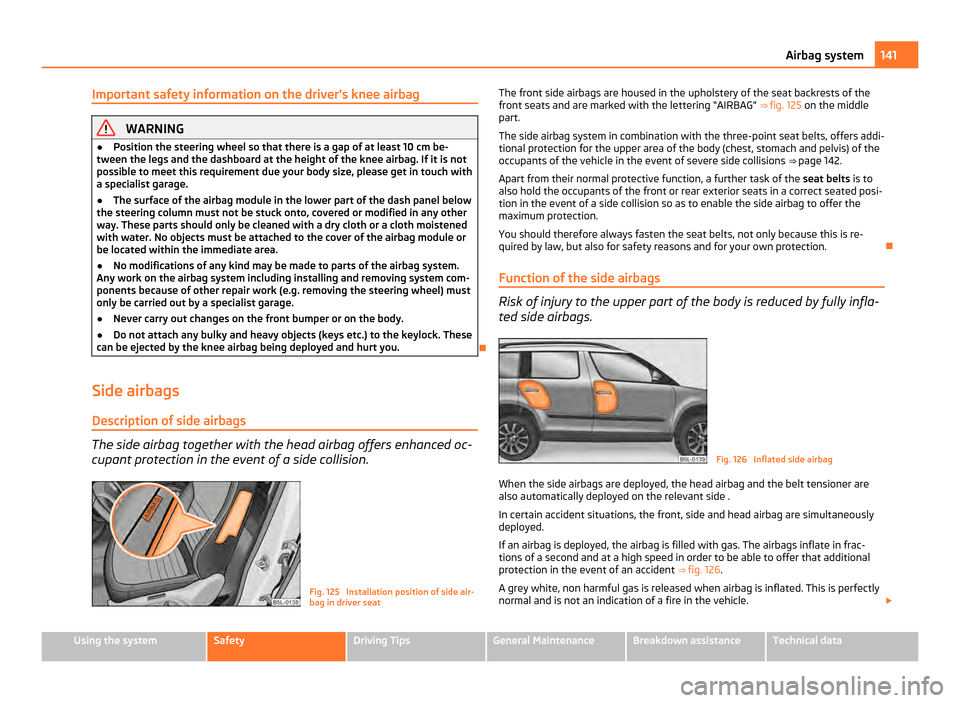
Important safety information on the driver's knee airbag
WARNING
● Position the steering wheel so that there is a gap of at least 10 cm be-
tween the legs and the dashboard at the height of the knee airbag. If it is not
possible to meet this requirement due your body size, please get in touch with
a specialist garage.
● The surface of the airbag module in the lower part of the dash panel below
the steering column must not be stuck onto, covered or modified in any other
way. These parts should only be cleaned with a dry cloth or a cloth moistened
with water. No objects must be attached to the cover of the airbag module or
be located within the immediate area.
● No modifications of any kind may be made to parts of the airbag system.
Any work on the airbag system including installing and removing system com-
ponents because of other repair work (e.g. removing the steering wheel) must
only be carried out by a specialist garage.
● Never carry out changes on the front bumper or on the body.
● Do not attach any bulky and heavy objects (keys etc.) to the keylock. These
can be ejected by the knee airbag being deployed and hurt you.
Side airbags Description of side airbags The side airbag together with the head airbag offers enhanced oc-
cupant protection in the event of a side collision.
Fig. 125 Installation position of side air-
bag in driver seatThe front side airbags are housed in the upholstery of the seat backrests of the
front seats and are marked with the lettering
“AIRBAG” ⇒ fig. 125 on the middle
part.
The side airbag system in combination with the three-point seat belts, offers addi-
tional protection for the upper area of the body (chest, stomach and pelvis) of the
occupants of the vehicle in the event of severe side collisions ⇒ page 142.
Apart from their normal protective function, a further task of the seat belts is to
also hold the occupants of the front or rear exterior seats in a correct seated posi-
tion in the event of a side collision so as to enable the side airbag to offer the
maximum protection.
You should therefore always fasten the seat belts, not only because this is re-
quired by law, but also for safety reasons and for your own protection.
Function of the side airbags Risk of injury to the upper part of the body is reduced by fully infla-
ted side airbags.
Fig. 126 Inflated side airbag
When the side airbags are deployed, the head airbag and the belt tensioner are
also automatically deployed on the relevant side .
In certain accident situations, the front, side and head airbag are simultaneously
deployed.
If an airbag is deployed, the airbag is filled with gas. The airbags inflate in frac-
tions of a second and at a high speed in order to be able to offer that additional
protection in the event of an accident ⇒
fig. 126 .
A grey white, non harmful gas is released when airbag is inflated. This is perfectly
normal and is not an indication of a fire in the vehicle. £ 141
Airbag system Using the system Safety Driving Tips General Maintenance Breakdown assistance Technical data
Page 147 of 252
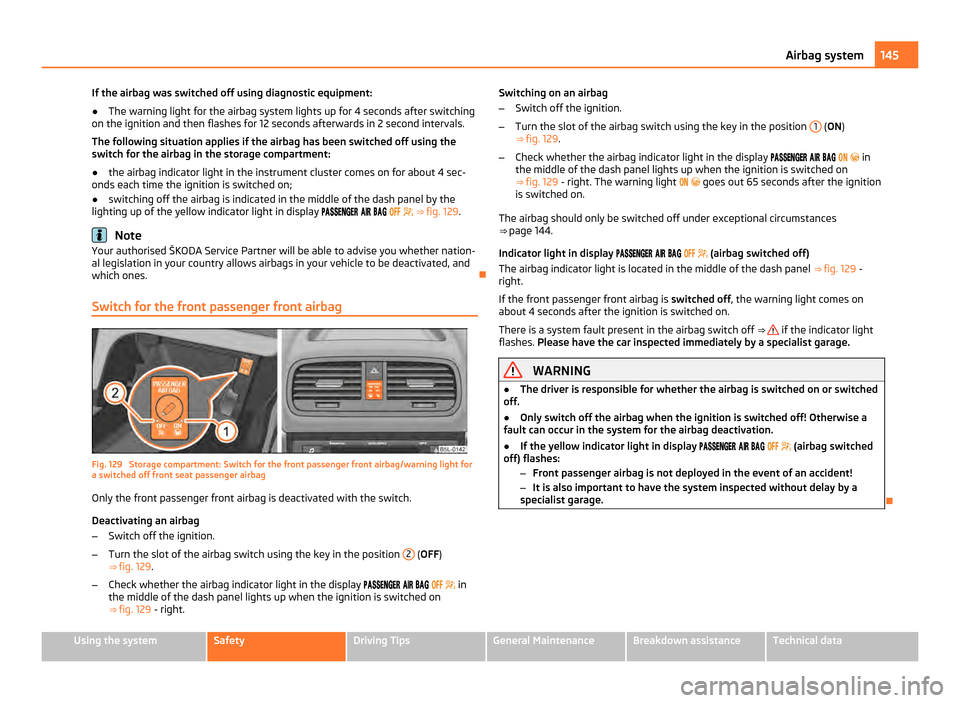
If the airbag was switched off using diagnostic equipment:
●
The warning light for the airbag system lights up for 4 seconds after switching
on the ignition and then flashes for 12 seconds afterwards in 2 second intervals.
The following situation applies if the airbag has been switched off using the
switch for the airbag in the storage compartment:
● the airbag indicator light in the instrument cluster comes on for about 4 sec-
onds each time the ignition is switched on;
● switching off the airbag is indicated in the middle of the dash panel by the
lighting up of the yellow indicator light in display
⇒ fig. 129 . Note
Your authorised ŠKODA Service Partner will be able to advise you whether nation-
al legislation in your country allows airbags in your vehicle to be deactivated, and
which ones.
Switch for the front passenger front airbag Fig. 129 Storage compartment: Switch for the front passenger front airbag/warning light for
a switched off front seat passenger airbag
Only the front passenger front airbag is deactivated with the switch.
Deactivating an airbag
– Switch off the ignition.
– Turn the slot of the airbag switch using the key in the position 2 (
OFF)
⇒ fig. 129 .
– Check whether the airbag indicator light in the display
in
the middle of the dash panel lights up when the ignition is switched on
⇒ fig. 129 - right. Switching on an airbag
–
Switch off the ignition.
– Turn the slot of the airbag switch using the key in the position 1 (
ON)
⇒ fig. 129 .
– Check whether the airbag indicator light in the display
in
the middle of the dash panel lights up when the ignition is switched on
⇒ fig. 129 - right. The warning light goes out 65 seconds after the ignition
is switched on.
The airbag should only be switched off under exceptional circumstances
⇒ page 144.
Indicator light in display (airbag switched off)
The airbag indicator light is located in the middle of the dash panel ⇒ fig. 129 -
right.
If the front passenger front airbag is switched off, the warning light comes on
about 4 seconds after the ignition is switched on.
There is a system fault present in the airbag switch off ⇒ if the indicator light
flashes. Please have the car inspected immediately by a specialist garage. WARNING
● The driver is responsible for whether the airbag is switched on or switched
off.
● Only switch off the airbag when the ignition is switched off! Otherwise a
fault can occur in the system for the airbag deactivation.
● If the yellow indicator light in display
(airbag switched
off) flashes:
–Front passenger airbag is not deployed in the event of an accident!
– It is also important to have the system inspected without delay by a
specialist garage. 145
Airbag system Using the system Safety Driving Tips General Maintenance Breakdown assistance Technical data
Page 189 of 252
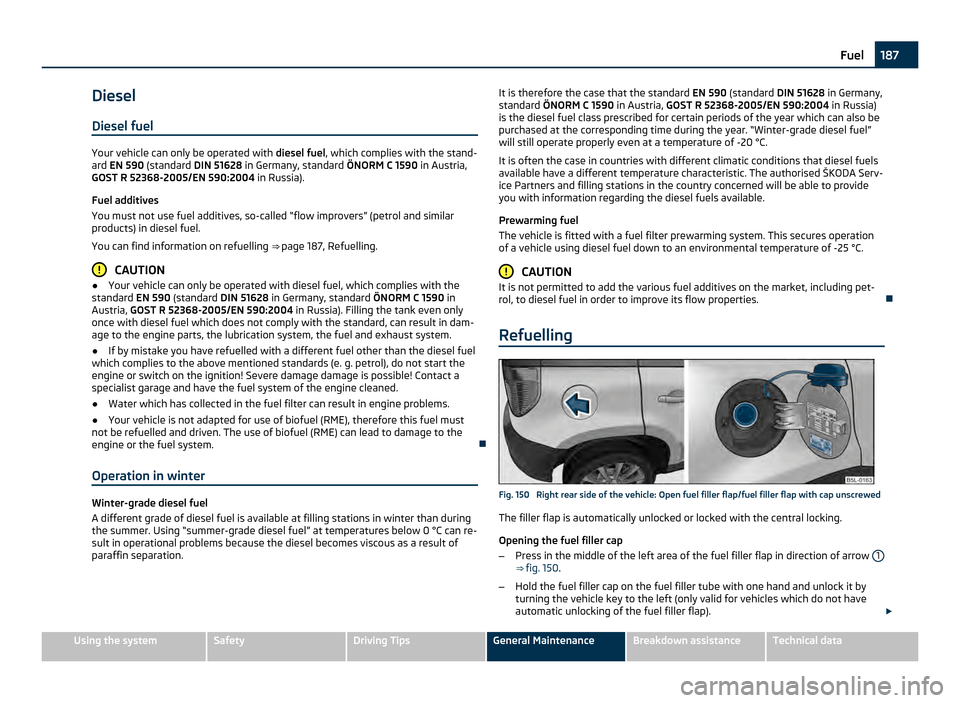
Diesel
Diesel fuel Your vehicle can only be operated with
diesel fuel, which complies with the stand-
ard EN 590 (standard DIN 51628 in Germany, standard ÖNORM
C 1590 in Austria,
GOST R 52368-2005/EN 590:2004 in Russia).
Fuel additives
You must not use fuel additives, so-called “flow improvers” (petrol and similar
products) in diesel fuel.
You can find information on refuelling ⇒ page 187, Refuelling. CAUTION
● Your vehicle can only be operated with diesel fuel, which complies with the
standard EN 590 (standard DIN 51628 in Germany, standard ÖNORM
C 1590 in
Austria, GOST R 52368-2005/EN 590:2004 in Russia). Filling the tank even only
once with diesel fuel which does not comply with the standard, can result in dam-
age to the engine parts, the lubrication system, the fuel and exhaust system.
● If by mistake you have refuelled with a different fuel other than the diesel fuel
which complies to the above mentioned standards (e.
g. petrol), do not start the
engine or switch on the ignition! Severe damage damage is possible! Contact a
specialist garage and have the fuel system of the engine cleaned.
● Water which has collected in the fuel filter can result in engine problems.
● Your vehicle is not adapted for use of biofuel (RME), therefore this fuel must
not be refuelled and driven. The use of biofuel (RME) can lead to damage to the
engine or the fuel system.
Operation in winter Winter-grade diesel fuel
A different grade of diesel fuel is available at filling stations in winter than during
the summer. Using
“summer-grade diesel fuel” at temperatures below 0 °C can re-
sult in operational problems because the diesel becomes viscous as a result of
paraffin separation. It is therefore the case that the standard
EN 590 (standard DIN 51628 in Germany,
standard ÖNORM
C 1590 in Austria, GOST R 52368-2005/EN 590:2004 in Russia)
is the diesel fuel class prescribed for certain periods of the year which can also be
purchased at the corresponding time during the year. “Winter-grade diesel fuel”
will still operate properly even at a temperature of -20 °C.
It is often the case in countries with different climatic conditions that diesel fuels
available have a different temperature characteristic. The authorised ŠKODA Serv-
ice Partners and filling stations in the country concerned will be able to provide
you with information regarding the diesel fuels available.
Prewarming fuel
The vehicle is fitted with a fuel filter prewarming system. This secures operation
of a vehicle using diesel fuel down to an environmental temperature of -25 °C. CAUTION
It is not permitted to add the various fuel additives on the market, including pet-
rol, to diesel fuel in order to improve its flow properties.
Refuelling Fig. 150 Right rear side of the vehicle: Open fuel filler flap/fuel filler flap with cap unscrewed
The filler flap is automatically unlocked or locked with the central locking.
Opening the fuel filler cap
–
Press in the middle of the left area of the fuel filler flap in direction of arrow 1 ⇒
fig. 150 .
– Hold the fuel filler cap on the fuel filler tube with one hand and unlock it by
turning the vehicle key to the left (only valid for vehicles which do not have
automatic unlocking of the fuel filler flap). £ 187
Fuel Using the system Safety Driving Tips General Maintenance Breakdown assistance Technical data
Page 190 of 252
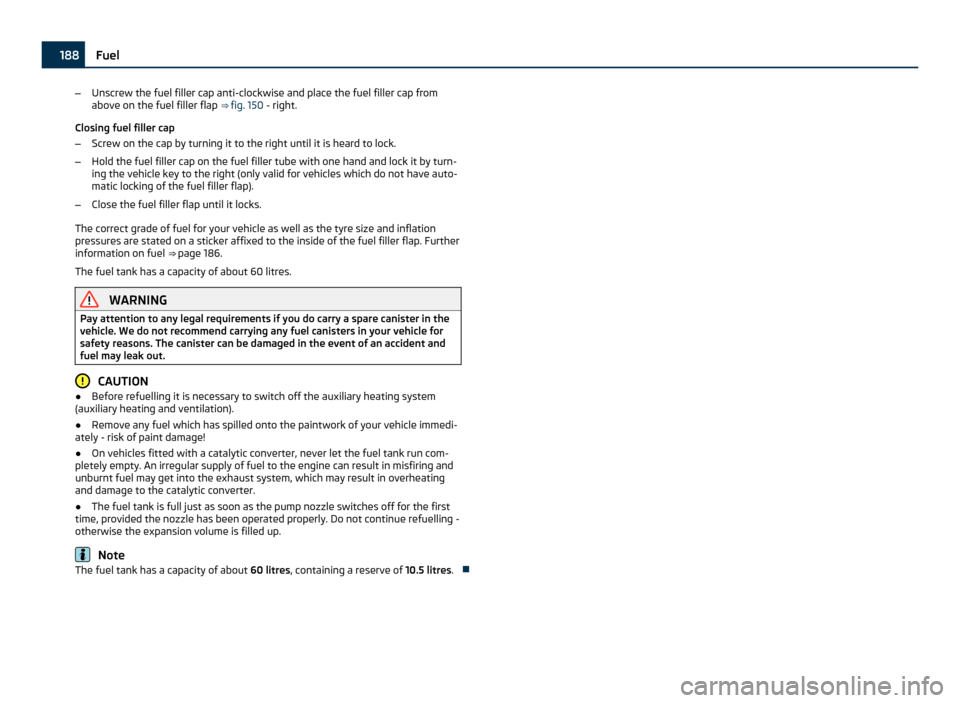
–
Unscrew the fuel filler cap anti-clockwise and place the fuel filler cap from
above on the fuel filler flap ⇒ fig. 150 - right.
Closing fuel filler cap
– Screw on the cap by turning it to the right until it is heard to lock.
– Hold the fuel filler cap on the fuel filler tube with one hand and lock it by turn-
ing the vehicle key to the right (only valid for vehicles which do not have auto-
matic locking of the fuel filler flap).
– Close the fuel filler flap until it locks.
The correct grade of fuel for your vehicle as well as the tyre size and inflation
pressures are stated on a sticker affixed to the inside of the fuel filler flap. Further
information on fuel ⇒
page 186.
The fuel tank has a capacity of about 60 litres. WARNING
Pay attention to any legal requirements if you do carry a spare canister in the
vehicle. We do not recommend carrying any fuel canisters in your vehicle for
safety reasons. The canister can be damaged in the event of an accident and
fuel may leak out. CAUTION
● Before refuelling it is necessary to switch off the auxiliary heating system
(auxiliary heating and ventilation).
● Remove any fuel which has spilled onto the paintwork of your vehicle immedi-
ately - risk of paint damage!
● On vehicles fitted with a catalytic converter, never let the fuel tank run com-
pletely empty. An irregular supply of fuel to the engine can result in misfiring and
unburnt fuel may get into the exhaust system, which may result in overheating
and damage to the catalytic converter.
● The fuel tank is full just as soon as the pump nozzle switches off for the first
time, provided the nozzle has been operated properly. Do not continue refuelling -
otherwise the expansion volume is filled up. Note
The fuel tank has a capacity of about 60 litres, containing a reserve of 10.5
litres.188
Fuel
Page 192 of 252
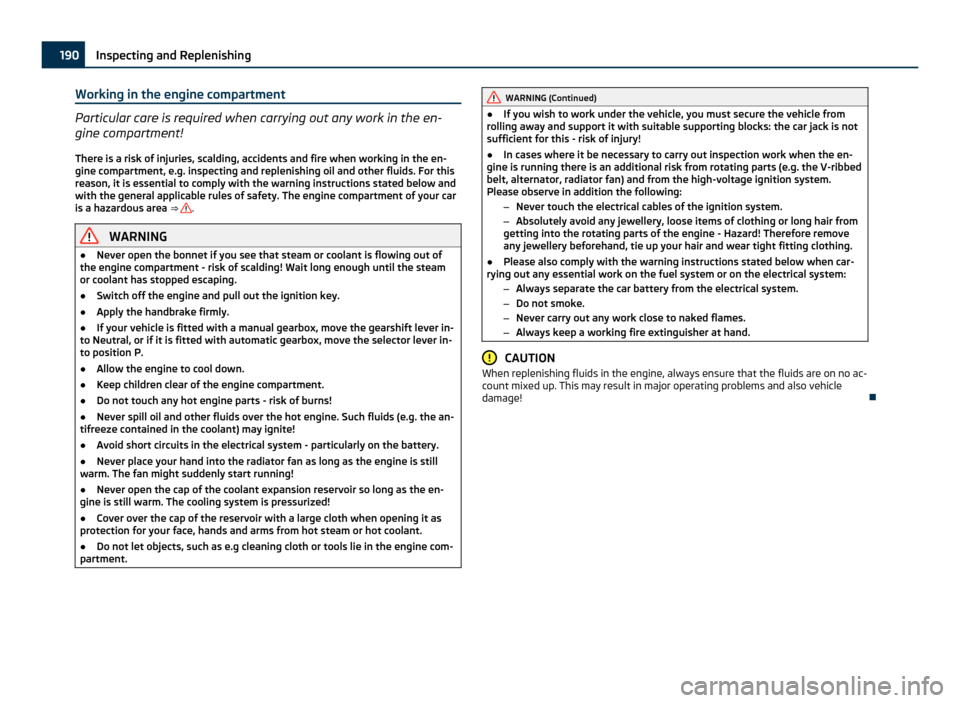
Working in the engine compartment
Particular care is required when carrying out any work in the en-
gine compartment!
There is a risk of injuries, scalding, accidents and fire when working in the en-
gine compartment, e.g. inspecting and replenishing oil and other fluids. For this
reason, it is essential to comply with the warning instructions stated below and
with the general applicable rules of safety. The engine compartment of your car
is a hazardous area ⇒
.
WARNING
● Never open the bonnet if you see that steam or coolant is flowing out of
the engine compartment - risk of scalding! Wait long enough until the steam
or coolant has stopped escaping.
● Switch off the engine and pull out the ignition key.
● Apply the handbrake firmly.
● If your vehicle is fitted with a manual gearbox, move the gearshift lever in-
to Neutral, or if it is fitted with automatic gearbox, move the selector lever in-
to position
P.
● Allow the engine to cool down.
● Keep children clear of the engine compartment.
● Do not touch any hot engine parts - risk of burns!
● Never spill oil and other fluids over the hot engine. Such fluids (e.g. the an-
tifreeze contained in the coolant) may ignite!
● Avoid short circuits in the electrical system - particularly on the battery.
● Never place your hand into the radiator fan as long as the engine is still
warm. The fan might suddenly start running!
● Never open the cap of the coolant expansion reservoir so long as the en-
gine is still warm. The cooling system is pressurized!
● Cover over the cap of the reservoir with a large cloth when opening it as
protection for your face, hands and arms from hot steam or hot coolant.
● Do not let objects, such as e.g cleaning cloth or tools lie in the engine com-
partment. WARNING (Continued)
● If you wish to work under the vehicle, you must secure the vehicle from
rolling away and support it with suitable supporting blocks: the car jack is not
sufficient for this - risk of injury!
● In cases where it be necessary to carry out inspection work when the en-
gine is running there is an additional risk from rotating parts (e.g. the V-ribbed
belt, alternator, radiator fan) and from the high-voltage ignition system.
Please observe in addition the following:
–Never touch the electrical cables of the ignition system.
– Absolutely avoid any jewellery, loose items of clothing or long hair from
getting into the rotating parts of the engine - Hazard! Therefore remove
any jewellery beforehand, tie up your hair and wear tight fitting clothing.
● Please also comply with the warning instructions stated below when car-
rying out any essential work on the fuel system or on the electrical system:
–Always separate the car battery from the electrical system.
– Do not smoke.
– Never carry out any work close to naked flames.
– Always keep a working fire extinguisher at hand. CAUTION
When replenishing fluids in the engine, always ensure that the fluids are on no ac-
count mixed up. This may result in major operating problems and also vehicle
damage! 190
Inspecting and Replenishing
Page 213 of 252
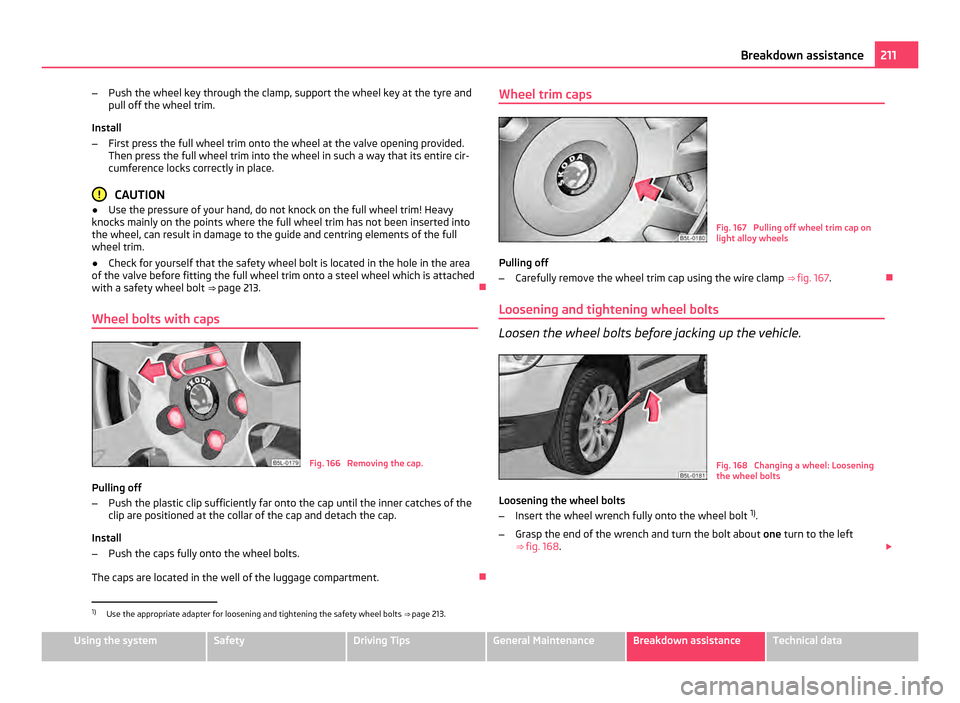
–
Push the wheel key through the clamp, support the wheel key at the tyre and
pull off the wheel trim.
Install
– First press the full wheel trim onto the wheel at the valve opening provided.
Then press the full wheel trim into the wheel in such a way that its entire cir-
cumference locks correctly in place. CAUTION
● Use the pressure of your hand, do not knock on the full wheel trim! Heavy
knocks mainly on the points where the full wheel trim has not been inserted into
the wheel, can result in damage to the guide and centring elements of the full
wheel trim.
● Check for yourself that the safety wheel bolt is located in the hole in the area
of the valve before fitting the full wheel trim onto a steel wheel which is attached
with a safety wheel bolt ⇒
page 213.
Wheel bolts with caps Fig. 166 Removing the cap.
Pulling off
– Push the plastic clip sufficiently far onto the cap until the inner catches of the
clip are positioned at the collar of the cap and detach the cap.
Install
– Push the caps fully onto the wheel bolts.
The caps are located in the well of the luggage compartment. Wheel trim caps
Fig. 167 Pulling off wheel trim cap on
light alloy wheels
Pulling off
– Carefully remove the wheel trim cap using the wire clamp ⇒ fig. 167.
Loosening and tightening wheel bolts Loosen the wheel bolts before jacking up the vehicle.
Fig. 168 Changing a wheel: Loosening
the wheel bolts
Loosening the wheel bolts
– Insert the wheel wrench fully onto the wheel bolt 1)
.
– Grasp the end of the wrench and turn the bolt about one turn to the left
⇒ fig. 168 . £1)
Use the appropriate adapter for loosening and tightening the safety wheel bolts ⇒ page 213. 211
Breakdown assistance Using the system Safety Driving Tips General Maintenance Breakdown assistance Technical data
Page 224 of 252
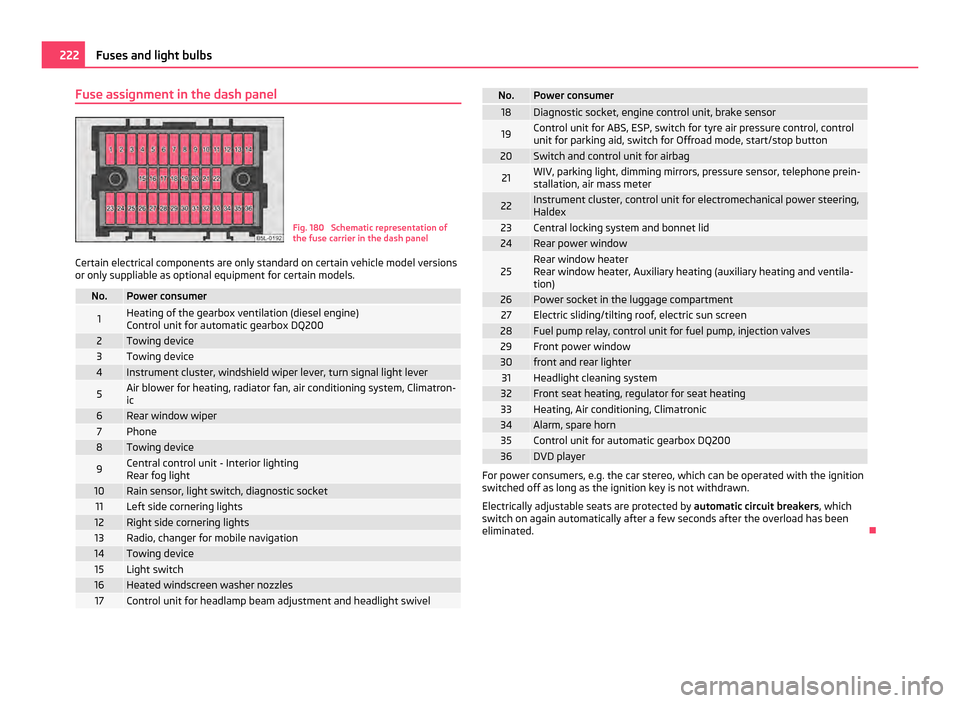
Fuse assignment in the dash panel
Fig. 180 Schematic representation of
the fuse carrier in the dash panel
Certain electrical components are only standard on certain vehicle model versions
or only suppliable as optional equipment for certain models. No. Power consumer
1 Heating of the gearbox ventilation (diesel engine)
Control unit for automatic gearbox DQ200 2 Towing device
3 Towing device
4 Instrument cluster, windshield wiper lever, turn signal light lever
5 Air blower for heating, radiator fan, air conditioning system, Climatron-
ic 6 Rear window wiper
7 Phone
8 Towing device
9 Central control unit - Interior lighting
Rear fog light
10 Rain sensor, light switch, diagnostic socket
11 Left side cornering lights
12 Right side cornering lights
13 Radio, changer for mobile navigation
14 Towing device
15 Light switch
16 Heated windscreen washer nozzles
17 Control unit for headlamp beam adjustment and headlight swivel No. Power consumer
18 Diagnostic socket, engine control unit, brake sensor
19 Control unit for ABS, ESP, switch for tyre air pressure control, control
unit for parking aid, switch for Offroad mode, start/stop button 20 Switch and control unit for airbag
21 WIV, parking light, dimming mirrors, pressure sensor, telephone prein-
stallation, air mass meter
22 Instrument cluster, control unit for electromechanical power steering,
Haldex 23 Central locking system and bonnet lid
24 Rear power window
25 Rear window heater
Rear window heater, Auxiliary heating (auxiliary heating and ventila-
tion)
26 Power socket in the luggage compartment
27 Electric sliding/tilting roof, electric sun screen
28 Fuel pump relay, control unit for fuel pump, injection valves
29 Front power window
30 front and rear lighter
31 Headlight cleaning system
32 Front seat heating, regulator for seat heating
33 Heating, Air conditioning, Climatronic
34 Alarm, spare horn
35 Control unit for automatic gearbox DQ200
36 DVD player
For power consumers, e.g. the car stereo, which can be operated with the ignition
switched off as long as the ignition key is not withdrawn.
Electrically adjustable seats are protected by
automatic circuit breakers, which
switch on again automatically after a few seconds after the overload has been
eliminated. 222
Fuses and light bulbs
Page 242 of 252
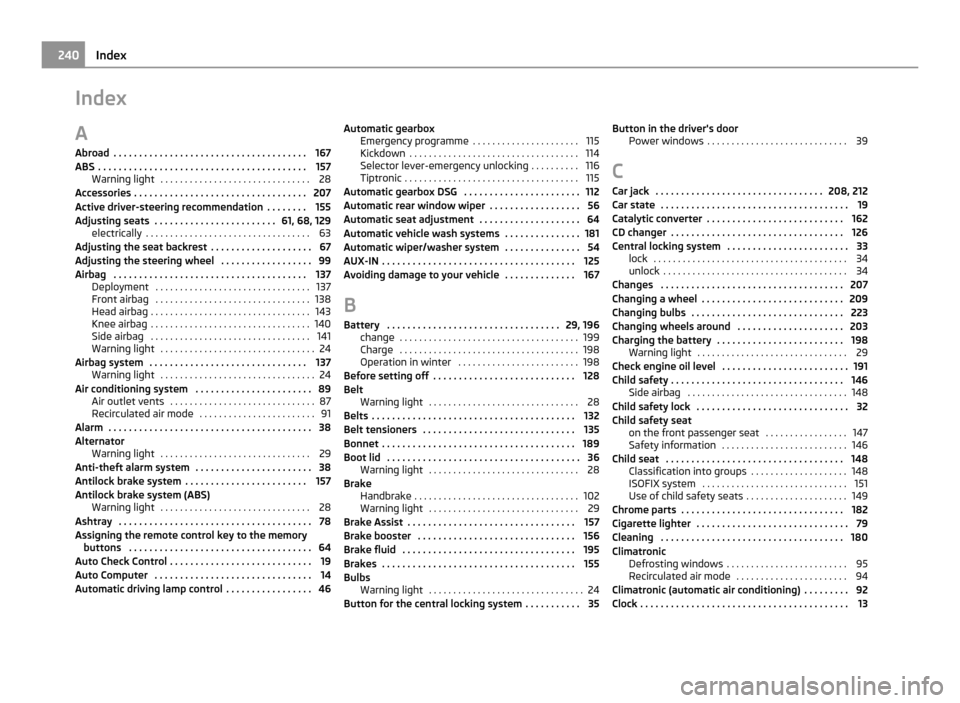
Index
A
Abroad . . . . . . . . . . . . . . . . . . . . . . . . . . . . . . . . . . . . . . 167
ABS . . . . . . . . . . . . . . . . . . . . . . . . . . . . . . . . . . . . . . . . . 157 Warning light . . . . . . . . . . . . . . . . . . . . . . . . . . . . . . . 28
Accessories . . . . . . . . . . . . . . . . . . . . . . . . . . . . . . . . . . 207
Active driver-steering recommendation . . . . . . . . 155
Adjusting seats . . . . . . . . . . . . . . . . . . . . . . . . 61, 68, 129 electrically . . . . . . . . . . . . . . . . . . . . . . . . . . . . . . . . . . 63
Adjusting the seat backrest . . . . . . . . . . . . . . . . . . . . 67
Adjusting the steering wheel . . . . . . . . . . . . . . . . . . 99
Airbag . . . . . . . . . . . . . . . . . . . . . . . . . . . . . . . . . . . . . . 137 Deployment . . . . . . . . . . . . . . . . . . . . . . . . . . . . . . . . 137
Front airbag . . . . . . . . . . . . . . . . . . . . . . . . . . . . . . . . 138
Head airbag . . . . . . . . . . . . . . . . . . . . . . . . . . . . . . . . . 143
Knee airbag . . . . . . . . . . . . . . . . . . . . . . . . . . . . . . . . . 140
Side airbag . . . . . . . . . . . . . . . . . . . . . . . . . . . . . . . . . 141
Warning light . . . . . . . . . . . . . . . . . . . . . . . . . . . . . . . . 24
Airbag system . . . . . . . . . . . . . . . . . . . . . . . . . . . . . . . 137 Warning light . . . . . . . . . . . . . . . . . . . . . . . . . . . . . . . . 24
Air conditioning system . . . . . . . . . . . . . . . . . . . . . . . 89 Air outlet vents . . . . . . . . . . . . . . . . . . . . . . . . . . . . . . 87
Recirculated air mode . . . . . . . . . . . . . . . . . . . . . . . . 91
Alarm . . . . . . . . . . . . . . . . . . . . . . . . . . . . . . . . . . . . . . . . 38
Alternator Warning light . . . . . . . . . . . . . . . . . . . . . . . . . . . . . . . 29
Anti-theft alarm system . . . . . . . . . . . . . . . . . . . . . . . 38
Antilock brake system . . . . . . . . . . . . . . . . . . . . . . . . 157
Antilock brake system (ABS) Warning light . . . . . . . . . . . . . . . . . . . . . . . . . . . . . . . 28
Ashtray . . . . . . . . . . . . . . . . . . . . . . . . . . . . . . . . . . . . . . 78
Assigning the remote control key to the memory buttons . . . . . . . . . . . . . . . . . . . . . . . . . . . . . . . . . . . . 64
Auto Check Control . . . . . . . . . . . . . . . . . . . . . . . . . . . . 19
Auto Computer . . . . . . . . . . . . . . . . . . . . . . . . . . . . . . . 14
Automatic driving lamp control . . . . . . . . . . . . . . . . . 46 Automatic gearbox
Emergency programme . . . . . . . . . . . . . . . . . . . . . . 115
Kickdown . . . . . . . . . . . . . . . . . . . . . . . . . . . . . . . . . . . 114
Selector lever-emergency unlocking . . . . . . . . . . 116
Tiptronic . . . . . . . . . . . . . . . . . . . . . . . . . . . . . . . . . . . . 115
Automatic gearbox DSG . . . . . . . . . . . . . . . . . . . . . . . 112
Automatic rear window wiper . . . . . . . . . . . . . . . . . . 56
Automatic seat adjustment . . . . . . . . . . . . . . . . . . . . 64
Automatic vehicle wash systems . . . . . . . . . . . . . . . 181
Automatic wiper/washer system . . . . . . . . . . . . . . . 54
AUX-IN . . . . . . . . . . . . . . . . . . . . . . . . . . . . . . . . . . . . . . 125
Avoiding damage to your vehicle . . . . . . . . . . . . . . 167
B Battery . . . . . . . . . . . . . . . . . . . . . . . . . . . . . . . . . . 29, 196 change . . . . . . . . . . . . . . . . . . . . . . . . . . . . . . . . . . . . . 199
Charge . . . . . . . . . . . . . . . . . . . . . . . . . . . . . . . . . . . . . 198
Operation in winter . . . . . . . . . . . . . . . . . . . . . . . . . 198
Before setting off . . . . . . . . . . . . . . . . . . . . . . . . . . . . 128
Belt Warning light . . . . . . . . . . . . . . . . . . . . . . . . . . . . . . . 28
Belts . . . . . . . . . . . . . . . . . . . . . . . . . . . . . . . . . . . . . . . . 132
Belt tensioners . . . . . . . . . . . . . . . . . . . . . . . . . . . . . . 135
Bonnet . . . . . . . . . . . . . . . . . . . . . . . . . . . . . . . . . . . . . . 189
Boot lid . . . . . . . . . . . . . . . . . . . . . . . . . . . . . . . . . . . . . . 36 Warning light . . . . . . . . . . . . . . . . . . . . . . . . . . . . . . . 28
Brake Handbrake . . . . . . . . . . . . . . . . . . . . . . . . . . . . . . . . . . 102
Warning light . . . . . . . . . . . . . . . . . . . . . . . . . . . . . . . 29
Brake Assist . . . . . . . . . . . . . . . . . . . . . . . . . . . . . . . . . 157
Brake booster . . . . . . . . . . . . . . . . . . . . . . . . . . . . . . . 156
Brake fluid . . . . . . . . . . . . . . . . . . . . . . . . . . . . . . . . . . 195
Brakes . . . . . . . . . . . . . . . . . . . . . . . . . . . . . . . . . . . . . . 155
Bulbs Warning light . . . . . . . . . . . . . . . . . . . . . . . . . . . . . . . . 24
Button for the central locking system . . . . . . . . . . . 35 Button in the driver's door
Power windows . . . . . . . . . . . . . . . . . . . . . . . . . . . . . 39
C Car jack . . . . . . . . . . . . . . . . . . . . . . . . . . . . . . . . . 208, 212
Car state . . . . . . . . . . . . . . . . . . . . . . . . . . . . . . . . . . . . . 19
Catalytic converter . . . . . . . . . . . . . . . . . . . . . . . . . . . 162
CD changer . . . . . . . . . . . . . . . . . . . . . . . . . . . . . . . . . . 126
Central locking system . . . . . . . . . . . . . . . . . . . . . . . . 33 lock . . . . . . . . . . . . . . . . . . . . . . . . . . . . . . . . . . . . . . . . 34
unlock . . . . . . . . . . . . . . . . . . . . . . . . . . . . . . . . . . . . . . 34
Changes . . . . . . . . . . . . . . . . . . . . . . . . . . . . . . . . . . . . 207
Changing a wheel . . . . . . . . . . . . . . . . . . . . . . . . . . . . 209
Changing bulbs . . . . . . . . . . . . . . . . . . . . . . . . . . . . . . 223
Changing wheels around . . . . . . . . . . . . . . . . . . . . . 203
Charging the battery . . . . . . . . . . . . . . . . . . . . . . . . . 198 Warning light . . . . . . . . . . . . . . . . . . . . . . . . . . . . . . . 29
Check engine oil level . . . . . . . . . . . . . . . . . . . . . . . . . 191
Child safety . . . . . . . . . . . . . . . . . . . . . . . . . . . . . . . . . . 146 Side airbag . . . . . . . . . . . . . . . . . . . . . . . . . . . . . . . . . 148
Child safety lock . . . . . . . . . . . . . . . . . . . . . . . . . . . . . . 32
Child safety seat on the front passenger seat . . . . . . . . . . . . . . . . . 147
Safety information . . . . . . . . . . . . . . . . . . . . . . . . . . 146
Child seat . . . . . . . . . . . . . . . . . . . . . . . . . . . . . . . . . . . 148 Classification into groups . . . . . . . . . . . . . . . . . . . . 148
ISOFIX system . . . . . . . . . . . . . . . . . . . . . . . . . . . . . . 151
Use of child safety seats . . . . . . . . . . . . . . . . . . . . . 149
Chrome parts . . . . . . . . . . . . . . . . . . . . . . . . . . . . . . . . 182
Cigarette lighter . . . . . . . . . . . . . . . . . . . . . . . . . . . . . . 79
Cleaning . . . . . . . . . . . . . . . . . . . . . . . . . . . . . . . . . . . . 180
Climatronic Defrosting windows . . . . . . . . . . . . . . . . . . . . . . . . . 95
Recirculated air mode . . . . . . . . . . . . . . . . . . . . . . . 94
Climatronic (automatic air conditioning) . . . . . . . . . 92
Clock . . . . . . . . . . . . . . . . . . . . . . . . . . . . . . . . . . . . . . . . . 13 240
Index
Page 246 of 252
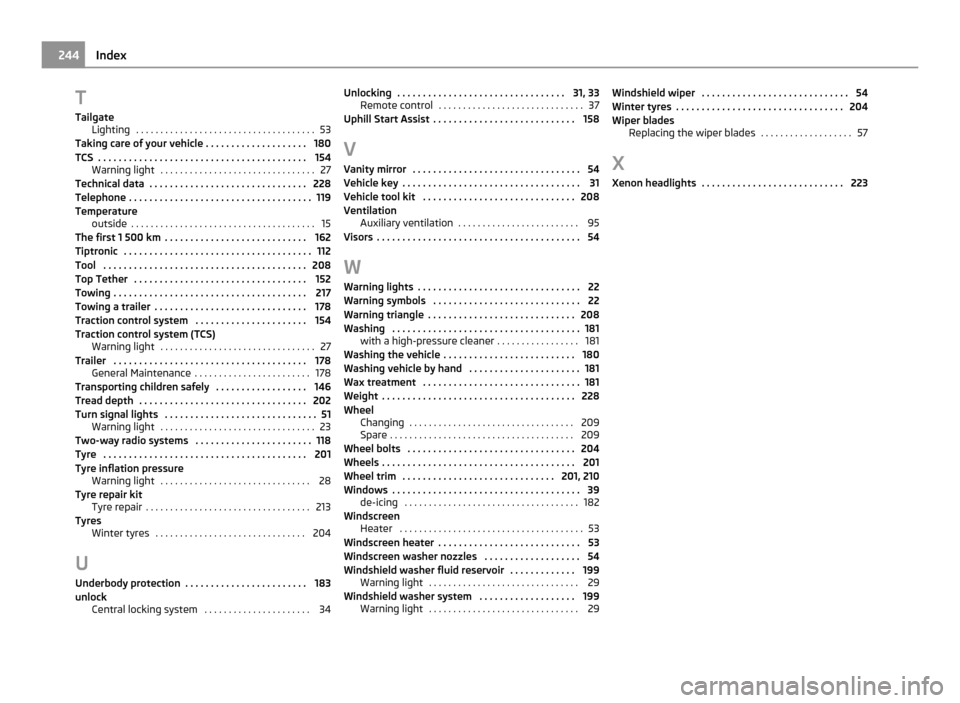
T
Tailgate Lighting
. . . . . . . . . . . . . . . . . . . . . . . . . . . . . . . . . . . . . 53
Taking care of your vehicle . . . . . . . . . . . . . . . . . . . . 180
TCS . . . . . . . . . . . . . . . . . . . . . . . . . . . . . . . . . . . . . . . . . 154 Warning light . . . . . . . . . . . . . . . . . . . . . . . . . . . . . . . . 27
Technical data . . . . . . . . . . . . . . . . . . . . . . . . . . . . . . . 228
Telephone . . . . . . . . . . . . . . . . . . . . . . . . . . . . . . . . . . . . 119
Temperature outside . . . . . . . . . . . . . . . . . . . . . . . . . . . . . . . . . . . . . . 15
The first 1 500 km . . . . . . . . . . . . . . . . . . . . . . . . . . . . 162
Tiptronic . . . . . . . . . . . . . . . . . . . . . . . . . . . . . . . . . . . . . 112
Tool . . . . . . . . . . . . . . . . . . . . . . . . . . . . . . . . . . . . . . . . 208
Top Tether . . . . . . . . . . . . . . . . . . . . . . . . . . . . . . . . . . 152
Towing . . . . . . . . . . . . . . . . . . . . . . . . . . . . . . . . . . . . . . 217
Towing a trailer . . . . . . . . . . . . . . . . . . . . . . . . . . . . . . 178
Traction control system . . . . . . . . . . . . . . . . . . . . . . 154
Traction control system (TCS) Warning light . . . . . . . . . . . . . . . . . . . . . . . . . . . . . . . . 27
Trailer . . . . . . . . . . . . . . . . . . . . . . . . . . . . . . . . . . . . . . 178 General Maintenance . . . . . . . . . . . . . . . . . . . . . . . . 178
Transporting children safely . . . . . . . . . . . . . . . . . . 146
Tread depth . . . . . . . . . . . . . . . . . . . . . . . . . . . . . . . . . 202
Turn signal lights . . . . . . . . . . . . . . . . . . . . . . . . . . . . . . 51 Warning light . . . . . . . . . . . . . . . . . . . . . . . . . . . . . . . . 23
Two-way radio systems . . . . . . . . . . . . . . . . . . . . . . . 118
Tyre . . . . . . . . . . . . . . . . . . . . . . . . . . . . . . . . . . . . . . . . 201
Tyre inflation pressure Warning light . . . . . . . . . . . . . . . . . . . . . . . . . . . . . . . 28
Tyre repair kit Tyre repair . . . . . . . . . . . . . . . . . . . . . . . . . . . . . . . . . . 213
Tyres Winter tyres . . . . . . . . . . . . . . . . . . . . . . . . . . . . . . . 204
U Underbody protection . . . . . . . . . . . . . . . . . . . . . . . . 183
unlock Central locking system . . . . . . . . . . . . . . . . . . . . . . 34 Unlocking . . . . . . . . . . . . . . . . . . . . . . . . . . . . . . . . . 31, 33
Remote control . . . . . . . . . . . . . . . . . . . . . . . . . . . . . . 37
Uphill Start Assist . . . . . . . . . . . . . . . . . . . . . . . . . . . . 158
V Vanity mirror . . . . . . . . . . . . . . . . . . . . . . . . . . . . . . . . . 54
Vehicle key . . . . . . . . . . . . . . . . . . . . . . . . . . . . . . . . . . . 31
Vehicle tool kit . . . . . . . . . . . . . . . . . . . . . . . . . . . . . . 208
Ventilation Auxiliary ventilation . . . . . . . . . . . . . . . . . . . . . . . . . 95
Visors . . . . . . . . . . . . . . . . . . . . . . . . . . . . . . . . . . . . . . . . 54
W
Warning lights . . . . . . . . . . . . . . . . . . . . . . . . . . . . . . . . 22
Warning symbols . . . . . . . . . . . . . . . . . . . . . . . . . . . . . 22
Warning triangle . . . . . . . . . . . . . . . . . . . . . . . . . . . . . 208
Washing . . . . . . . . . . . . . . . . . . . . . . . . . . . . . . . . . . . . . 181 with a high-pressure cleaner . . . . . . . . . . . . . . . . . 181
Washing the vehicle . . . . . . . . . . . . . . . . . . . . . . . . . . 180
Washing vehicle by hand . . . . . . . . . . . . . . . . . . . . . . 181
Wax treatment . . . . . . . . . . . . . . . . . . . . . . . . . . . . . . . 181
Weight . . . . . . . . . . . . . . . . . . . . . . . . . . . . . . . . . . . . . . 228
Wheel Changing . . . . . . . . . . . . . . . . . . . . . . . . . . . . . . . . . . 209
Spare . . . . . . . . . . . . . . . . . . . . . . . . . . . . . . . . . . . . . . 209
Wheel bolts . . . . . . . . . . . . . . . . . . . . . . . . . . . . . . . . . 204
Wheels . . . . . . . . . . . . . . . . . . . . . . . . . . . . . . . . . . . . . . 201
Wheel trim . . . . . . . . . . . . . . . . . . . . . . . . . . . . . . 201, 210
Windows . . . . . . . . . . . . . . . . . . . . . . . . . . . . . . . . . . . . . 39 de-icing . . . . . . . . . . . . . . . . . . . . . . . . . . . . . . . . . . . . 182
Windscreen Heater . . . . . . . . . . . . . . . . . . . . . . . . . . . . . . . . . . . . . . 53
Windscreen heater . . . . . . . . . . . . . . . . . . . . . . . . . . . . 53
Windscreen washer nozzles . . . . . . . . . . . . . . . . . . . 54
Windshield washer fluid reservoir . . . . . . . . . . . . . 199 Warning light . . . . . . . . . . . . . . . . . . . . . . . . . . . . . . . 29
Windshield washer system . . . . . . . . . . . . . . . . . . . 199 Warning light . . . . . . . . . . . . . . . . . . . . . . . . . . . . . . . 29 Windshield wiper . . . . . . . . . . . . . . . . . . . . . . . . . . . . . 54
Winter tyres
. . . . . . . . . . . . . . . . . . . . . . . . . . . . . . . . . 204
Wiper blades Replacing the wiper blades . . . . . . . . . . . . . . . . . . . 57
X Xenon headlights . . . . . . . . . . . . . . . . . . . . . . . . . . . . 223 244
Index